What’s Up With The Blank Page Between the Old and New Testament
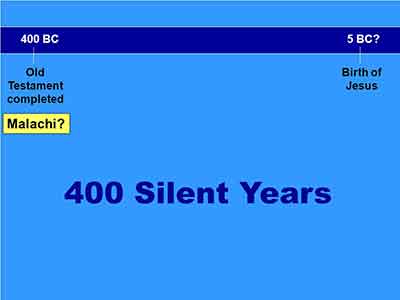
Question: Please explain what was happening between the Old and New Testament represented by the blank page.
Reply: This is an excellent and thought-provoking question that has many aspects which will lead many back into the scriptures to find even more answers. In the discovery of biblical truth, any questioning, which leads the respondent and the inquirer to the scriptures for discovery, is commendable. The very best way to approach such a question would be to address it directly, so for one, many bibles do literally have a blank page transition between the Old Testament and the New Testament.
The period between the two is called the Intertestamental Period.
This is the four hundred years between the Prophet Malachi and John the Baptist, the Prophet who preached “Prepare ye the way of the Lord”. Which simply meant, the Lord is coming, prepare your hearts and minds and soul for his coming. This no doubt should have been a welcomed message with what the Jewish Nation had experienced, 400 years without a Prophet saying to the people, “Thus saith the Lord…”
History During the 400 Years: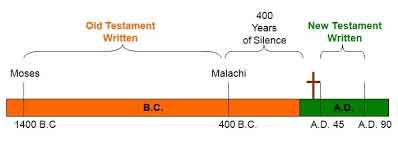
A lot transpired in the world and in the life of the Jewish Nation of Israel. Great empires spoken of by the Prophet Daniel had risen and still greater ones fell during the 400 year period. The Great unshakable Babylonian Empire (current-day Iraq) had already given way violently to the Medo-Persian Empire (current-day Iran) during Daniel’s lifetime. For 100 years before the close of the Old Testament through 100 years after its close, the Persians ruled the Nation of Israel and allowed the Jews to practice their religious beliefs without interference.
Alexander the Great (the Greeks) defeated the Persians in three major battles and controlled the lands of the Persian Empire. Again the Nation of Israel was allowed by the Greeks to observe Jewish beliefs and laws, but Alexander brought the attractive Greek Culture call Hellenism to the Jewish Nation.
After Alexander died, his empire which extended around the world was divided into two dynasties the Seleucid and Ptolemaic Dynasties; with the Ptolemies ruling Judea and again the Jewish Nation, had religious and economic freedom.
In 198 B.C. the Seleucid ruler, Antiochus III defeated the Ptolemy King and the entire region of Palestine was under his control. His descendant Antiochus IV Epiphanes, desecrated the Jewish temple and imposed Hellenistic culture on the entire region (including Judea). Religious persecution was initiated against the Jews, worship and social practices of Judaism were banded, Torahs (Jewish Bible) were burned, circumcision was forbidden and eating of pork and offering strange sacrifices on the altar of God were the order of the day.
Such persecution continued until Judas Maccabeus and his four brothers (sons of Mattathias a Priest) rebelled and after 25 years of fighting, the Jews were given their independents. The strong Greek influence was still pervasive in Israel, with successive High Priests following the strong Hellenistic secular order.
The rising Romans military machine conquered the Seleucid Empire and took control of the region. The Romans installed a Jewish Proselyte, Herod the Great, as the King of Judea. Herod had a Hellenistic outlook and was the King at the end of the 400 year period, at the birth of Christ.
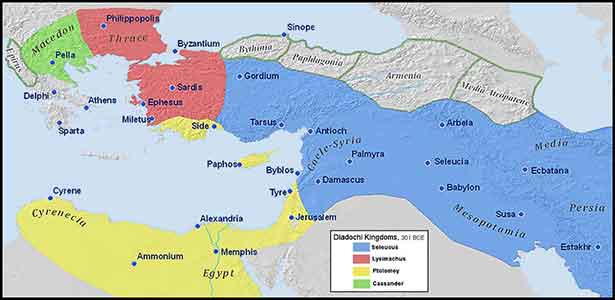
Wow! A lot happened during the blank “400 years” after Malachi. By the way, overlay 1) the returning Jews from the diaspora beginning with the Medo-Persian conquest of Babylon, 2) Nehemiah and Ezra the Scribe working to educate Jews in the Law of God; and consider 3) the translation of the Jewish Torah into the Greek Septuagint, 4) the formation of the Pharisees and the Sadducees Sects, 5) and Greco-Roman Hellenism which has proliferated civilization to this very hour, then the “blank page” becomes more like the most concentrated and potent period in shaping world history, up to that time. Through these proliferated events in antiquity, we can see that the proverbial hand of God was moving, impacting the rise and fall of nations, shaping the environment that Christ would enter into, as Savior of the world. At the point when Christ entered the world, there has been quite an immensity of principalities and powers of the air from which the world needed saving.
During this period a philosophy called Secular Humanism, which espouses that human beings are capable of being ethical and moral without religion or God was set as the dominant “World-view” of the day, through to this very moment. However, Secular Humanism was not new; it was initiated early, in the Garden of Eden with the Prince and the Principals.
The scriptures recount that Adam and Eve literally walked with God in the Garden of Eden, as one would go on a walk today with a friend. Despite this closeness, the Prince of this world (the Devil) found a way to teach Adam and Eve the tenants of Secular Humanism, an independence from God, a thought of, “Do I really have a need for God?”
He said to the woman, “Did God actually say, ‘You shall not eat of any tree in the garden’?” 2 And the woman said to the serpent, “We may eat of the fruit of the trees in the garden, 3 but God said, ‘You shall not eat of the fruit of the tree that is in the midst of the garden, neither shall you touch it, lest you die.’” 4 But the serpent said to the woman, “You will not surely die. 5 For God knows that when you eat of it your eyes will be opened and you will be like God, knowing good and evil.” 6 So when the woman saw that the tree was good for food, and that it was a delight to the eyes, and that the tree was to be desired to make one wise, she took of its fruit and ate, and she also gave some to her husband who was with her, and he ate. 7 Then the eyes of both were opened and they knew that they were naked. And they sewed fig leaves together and made themselves loincloths. 8 And they heard the sound of the LORD God walking in the garden in the cool of the day, and the man and his wife hid themselves from the presence of the LORD God among the trees of the garden. (ESV)
Greco-Roman Hellenism, which ushering in this Humanism and separation from God, was even more firmly established during this period of no prophets; however the Word of God existed and had been recorded and promulgated in various languages and was already a moving force through the World; and the Nation of Israel, was still the main source of the Word of God, as ensured by God through the work of Ezra the scribe and Nehemiah at the return of the diaspora to Judea. God was already preparing the Nation of Israel and the World for the coming of the promised Messiah (Jesus the Christ), through the promulgation and teachings of His Word, using the Holy Torah (called the writings of Moses) which included the first five books of the Bible—Genesis, Exodus, Leviticus, Numbers, and Deuteronomy. The Torah in Greek is called the Pentateuch (which means the five books).
Moses created over 600 individual laws and ordinances/regulations to institute what was commanded in the Torah. In our reading of the Old Testament books, we see many statutes created for the people, from instructions on cleanliness, edible foods to proper reverence for God. Many of which were approaches to judging between people over common law or issues such as when can a man or woman remarry, or how to present tithes and offerings. These had become so burdensome that Moses speaking for God to the people, declared in Deuteronomy 18, 18 “I will raise up for them a prophet like you from among their brothers. And I will put my words in his mouth, and he shall speak to them all that I command him. 19 And whoever will not listen to my words that he shall speak in my name, I myself will require it of him.”
During the Intertestamental period (200 CE) the Talmud was assembled. It has two parts the Mishnah (the oral teachings and rabbinic discussions and the Tannaitic, writings that often venture into other subjects and expounds broadly on the Hebrew Bible. The Talmud is the source from which the code of Jewish Halakhah (law) is derived. These were the articles in use by the Pharisees and Sadducees at Advent, during Christ’s Earthly ministry and beyond.
As we know from the Gospels, Jesus spent quite a bit of time providing clarification, just as Deuteronomy 18:18 stated that what He (the Messiah) would do when he came. The Gospel well chronicles the religious arguments presented by the Scribes, Pharisee and other religious rulers of that day; these teachings and instructions had often departed quite a bit from God’s original and true intent and from the spirit of the law.
For instance, the religious leaders of that time would never pronounce God’s name or permit others to do so, but Deuteronomy and other earlier documents have over 1,800 occurrences of Jehovah. God’s name is actually encouraged to be used in the Torah. Such examples show how really slanted and off track the Religious Rulers were at the time of Christ’s ministry, coming out of the 400 years; this is despite the fact that the Jews had been allowed to practice religious freedom by all but one of the conquering empires.
Explanation:
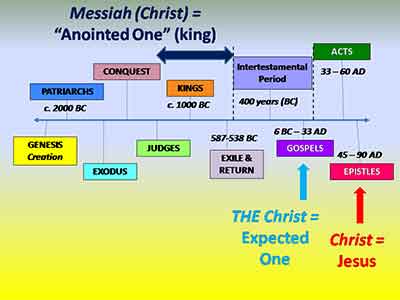 As it is with most things, spending a little time to go over the historical events pays off, when one is attempting to discover cause and effect. Such inquiries are made even more difficult when one tries to boil things down by identifying the few major factors of causation, from what I would call the most important time at that point in history. To address the occurrences and events of the Intertestamental Period leading up to the advent of Christ is even more convoluted, and is anything but “blank”, with respect to Theology and Human History.
As it is with most things, spending a little time to go over the historical events pays off, when one is attempting to discover cause and effect. Such inquiries are made even more difficult when one tries to boil things down by identifying the few major factors of causation, from what I would call the most important time at that point in history. To address the occurrences and events of the Intertestamental Period leading up to the advent of Christ is even more convoluted, and is anything but “blank”, with respect to Theology and Human History.
Now that a short study has been undertaken, we may characterize the Intertestamental Period similar to that of the pre-flood period, when Noah was building the Ark.
5 “The Lord saw how great the wickedness of the human race had become on the earth, and that every inclination of the thoughts of the human heart was only evil all the time. 6 The Lord regretted that he had made human beings on the earth, and his heart was deeply troubled. 7 So the Lord said, “I will wipe from the face of the earth the human race I have created—“
However, one thing makes it all the difference in the world; God chose to close the 400 years between the Old and New Testaments, not with a flood, but with the greatest gifts to mankind ever given. Instead of destroying mankind, God provided to mankind four gifts 1) a Prophet to Herald the coming of his son to save the World from sin and death, 2) the miracle of Chorus of Angels to announce His Son’s Birth (who came to save the whole world), 3) a declared peace between God and man, 4) and the Holy Blessed Spirit as a guarantor of the expressed promises made by God in the biblical record.
These miraculous gifts from God were timely. For we beheld and are grateful as the hymn writer surely penned in the great verse, as the world was coming out of a 400 year period to a new dawn… “O holy night, the stars are brightly shining. It is the night of our dear Savior’s birth. Long lay the world in sin and error pining, Til he appeared and the soul felt its worth. The thrill of hope, the weary world rejoices, For yonder breaks a new and glorious morn. Fall on your knees, Oh, hear the angel voices. O night divine, O night when Christ was born O night divine, O night, O night divine.”
Summary:
The summary of the whole matter is that during the 400 years that are considered a blank page, and though the World was ruinous enough and sinful enough, just as it was in Noah’s days, God pitied and loved us enough, to no longer delay the coming of His Son, the promised Messiah to save us from this death; which we had been cast into by our forefathers and foremothers and my our own actions of sin.
The gift was to the Jewish Nation and to the Gentiles alike. The World at that point, including the Jewish Nation, though they held the Books of the Law and the Prophets, they continued to act as if they knew nothing of His coming. And, which is more, the Jews together with the ruling empire of the day (Rome) agreed to torture and kill the Holy Son of God, the Messiah, but only because it was allowed and was the very plan of God, to offer his Son as a sacrifice for the whole world. In fact, the scriptures state, in Isaiah 53…
Isaiah 53 3 He is despised and rejected of men; a man of sorrows, and acquainted with grief: and we hid as it were our faces from him; he was despised, and we esteemed him not. 4Surely he hath borne our griefs, and carried our sorrows: yet we did esteem him stricken, smitten of God, and afflicted. 5But he was wounded for our transgressions, he was bruised for our iniquities: the chastisement of our peace was upon him; and with his stripes we are healed. (KJV)
The Joy of the Savior’s birth, the sorrow of his passion and death, are now all placed against the setting of this recent season, the Resurrection of Our Lord and Savior Jesus Christ. This includes his meeting with some of his disciples after his resurrection, being seen by many others, and his final commission given to his current and future disciples, to preach the Gospel of Jesus Christ, to the World for the salvation of souls. And this commission, until we arrive in heaven, is our chief Joy, for we see the promises of God fulfilled in Christ’s Birth, Life, Death, Resurrection, and Christ’s ascension into heaven (to make propitiation for our sins) and finally in his coming again, to receive his own. We celebrate with those who love his coming, with all who long for heaven and home with God our Father, Jesus our Lord, the Holy Spirit and with our fellow believers. The joy associated with that, overflows the 400 years, voids the negativity of the period and overflows the history of the period and fills the blank page with “His Story”.
History
Arise, Arise, Old Slumbering Scribe,
Old Ancient Scribbler, Old full of eyes.
Awake, Awake and cross the waters,
For another who sleepeth has been revived.
Go now go quickly and begin,
For one so worthy of thy pen,
Has stirred, gathered herself,
And walks this mighty way again.
Awake I say, Awake,
For Noble History’s sake.
Awake and cross the sea.
Swim Old Great One, toward the western bend,
Towards the Free.
Come see, Come see, thine heir apparent,
Full of splendor, pomp and grandeur.
Whilst thou tarried, she has enslaved
And freed and enslaved again,
Whilst thou meanders.
She has blown the trump of war,
And carried the torch of hypocrisy.
She roared, conquered, and stretched
Out her borders from sea-to-sea.
And will thou record her in they favor,
A Rebel, Libertine, Zealot or Savior?
And of Her great works from shore-to-shore,
Will they last forever more?
Speaketh thou of her great devices,
Of which the world will never tire?
That squeaked and roared and zoomed and glided,
That set this mortal world afire.
Awake, I say, but still He sleeps,
Not a stir, not a peep.
As if to say, “I will not rise,
I have already recorded all Lies.”
“In other times, in other places,
With other rhetoric, though different faces.”
“In days of yore, in times of old,
I’m sorry but Her story’s told.”
“I rise no more for futile nations,
But sleepeth on through selfish, cursed generations.”
“Til last, I rise to complete the work,
That chronicles mankind’s self-inflicted hurt.”
“Then and only then, I rise, to open up the
Judgment Book, into which only one dare look.”
“Then she, as all the rest may see,
That there is only “pain” in Human History.”
by Elbert Sherrod
Recommended Posts
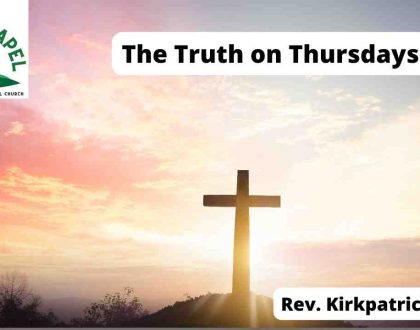
Truth on Thursdays
June 08, 2023
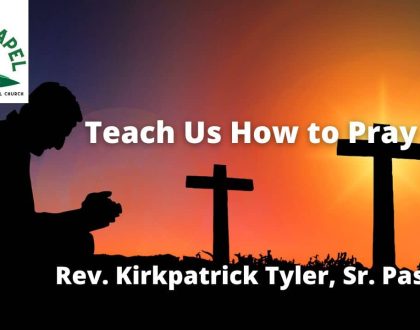
How Do I Know God Is Answering My Prayers?
October 20, 2022
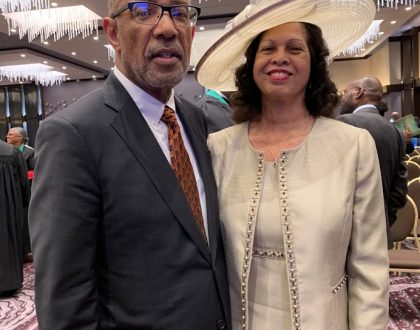
Q&A With Our New Pastor, Reverend Reuben W. Ford
December 24, 2019
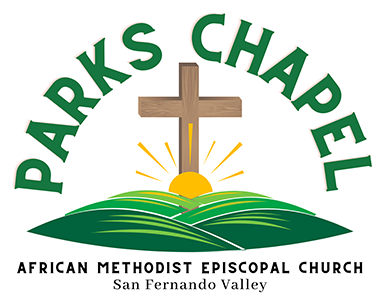
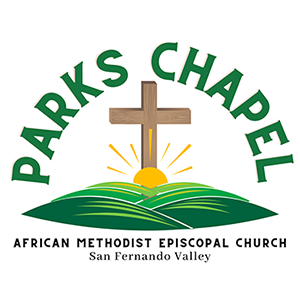
Someone once said “one of the best decisions I ever made was to remove the blank page that split the old from the new testament…”
There is so much truth in this statement. The day we start treating the old Testament also as God’s word “given by inspiration…profitable for doctrine…for reproof…for correction…for instruction in righteousness…” is the day “that the man of God (will become) perfect…throughly furnished unto all good works” (2 Tim 3v16)